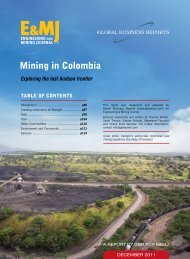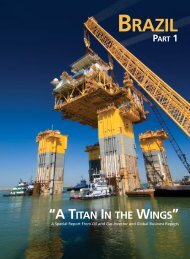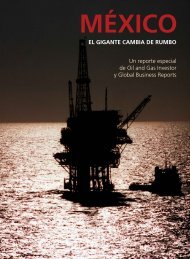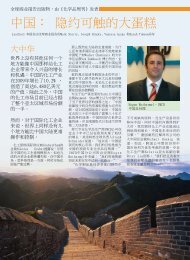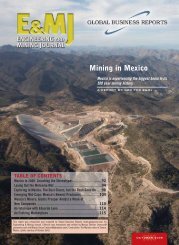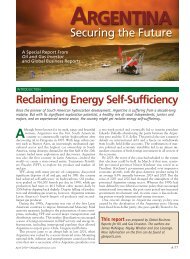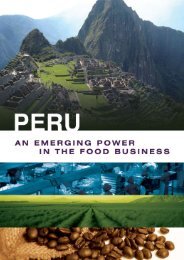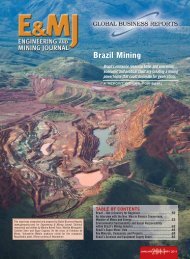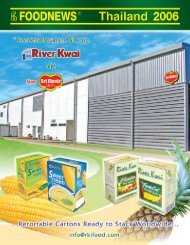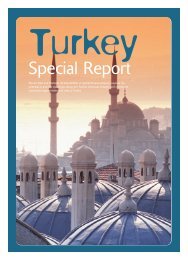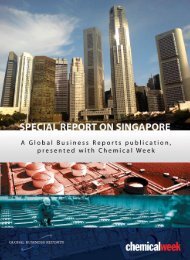Turkey Chemicals 2005 - GBR
Turkey Chemicals 2005 - GBR
Turkey Chemicals 2005 - GBR
Create successful ePaper yourself
Turn your PDF publications into a flip-book with our unique Google optimized e-Paper software.
Joining Chemistries<br />
<strong>Turkey</strong><br />
p r o f i l e
Introduction<br />
chemicals in turkey: Bridging the Gap?<br />
On the threshold of Europe, <strong>Turkey</strong>, with a population<br />
of 70million and a dynamic economy, is trying<br />
to move ahead and forget about the political instability,<br />
economic crisis and other ordeals that have plagued<br />
the country over the last two decades.The advent of a one<br />
party majority under the leadership of Prime Minister<br />
Recep Tayyip Erdogan was the signal that the country had<br />
eagerly awaited for to press ahead with the necessary economic<br />
and political reforms required by the EU to start<br />
accession negotiations.Two years on,<strong>Turkey</strong> has reformed a<br />
large number of fundamental socio-economic parameters,<br />
curbed the 15 years of insurgency in the East and has granted<br />
renewed rights to its Kurdish minority. The European<br />
Commission has advised in favour of the start of discussions<br />
for the accession of <strong>Turkey</strong> to the EU and in December, a<br />
formal date is expected to be set for the process to begin.<br />
<strong>Turkey</strong> is now waiting for the decision that will sustain the<br />
momentum of its ambitious reform agenda and shape its<br />
destiny for the next decades.<br />
Since the massive financial crisis in 2001, <strong>Turkey</strong> has<br />
strengthened its economy, displaying robust growth(2003:<br />
5.8%), enjoying double digit increases in industrial output<br />
indicators and expanding exports throughout the world,<br />
with, for instance a 30.5% increase year on year in 2003 for<br />
a total amount of $47 billion. Now the largest exporter of<br />
textile products in Europe,<strong>Turkey</strong> has also consolidated its<br />
credentials as a car manufacturer, a metal producing country,<br />
an agricultural powerhouse and a tourism destination of<br />
choice. The international investment community is finally<br />
recognising these credentials. According to recent predictions<br />
by the Institute of International Finance (IIF), as much<br />
as 60% of the portfolio equity that flows into Europe's<br />
This report was prepared by London-based Global Business<br />
Reports after meeting with some of the chemical industry’s leaders<br />
and upcoming players. It highlights some of the elements faced by<br />
the Turkish chemical industry at times of changes by the country as<br />
a whole. Authors are Guillaume Vigneron and Luke Gribbon,<br />
(gvigneron@gbreports.com; luke@gbreports.com) chemical<br />
reporters, and Alice Bourrouet, project and marketing coordinator,<br />
Global Business Reports. (alice@gbreports.com)<br />
cover picture: span across Europe and Asia,<strong>Turkey</strong> is a meeting point.<br />
Credit:Yaz Yazicioglu 2004<br />
emerging markets will target <strong>Turkey</strong> next year. Meanwhile,<br />
on the back of the country’s good economic performance<br />
and the progress in its privatization process, <strong>Turkey</strong> is<br />
expected to attract $2.8bn of foreign direct investment<br />
(FDI) in <strong>2005</strong>, with $2.4bn expected to be achieved by the<br />
end of 2004; this after years of abysmal performances.Yet,<br />
since the 1980s, the Turkish government has followed liberal,<br />
out-ward-oriented economic polices, shaking up the<br />
economic and social structure of <strong>Turkey</strong>. Deregulation of<br />
interest rates, the establishment of organized markets for<br />
money, foreign exchange and securities, the liberalization of<br />
capital movements and reform of the banking sector were<br />
just some of the changes. The FDI framework has also<br />
recently been simplified and <strong>Turkey</strong> continues to make a lot<br />
of effort to promote itself as a safe and sound investment<br />
destination.The incentive scheme is currently being dusted<br />
off and a strong PR campaign has been initiated to raise the<br />
profile of the country towards the global investment community.<br />
Serving the many industries of <strong>Turkey</strong>, the domestic<br />
chemical industry is also expanding steadily and has started<br />
to attract foreign investments too. From the early days of<br />
import substitution policies in the 1960s through to the<br />
ultra aggressive export promotion policy of Prime Minister<br />
Turgut Ozal in the 1980s, the chemical industry has played<br />
a key part in the country’s industrial development and is<br />
today integrated into the supply chain of national industries<br />
especially, textiles and the automotive sector, while also<br />
scoring the occasional export sale in a region where <strong>Turkey</strong><br />
is both a gateway and an almost compulsory point of transit.The<br />
industry achieves an overall turnover of $18-20 bn<br />
yearly. Domestic production totals $11 bn, with imports of<br />
$9 bn to top up the bill, and chemical products exports<br />
reach $1.5bn, or $3.5bn including intermediaries.<br />
The industry, employing 50,000 people across 6,000<br />
Small and Medium Enterprises, is a key component of the<br />
Turkish industry, both from the perspective of its relative<br />
size and importance for the economy, and as a part of the<br />
overall Turkish supply chain and industrial fabric. It has<br />
gone from strength to strength.W ith direct access to Iran<br />
and Iraq, and constituting a major transit point for Russian<br />
hydrocarbon products as well as benefiting from longstanding<br />
trade partnership with the EU notably based on a<br />
34<br />
November 24, 2004<br />
A Global Business Reports Publication,presented with Chemical Week
COUNTRY FOCUS: TURKEY<br />
Customs Union,<strong>Turkey</strong> has a solid tradition of international<br />
trade. The chemical industry, mainly inward looking in<br />
the past, is today increasingly raising its global profile and<br />
ambitions.<br />
As a key contact point between Asia and Europe, the<br />
Middle East and Central Asia,<strong>Turkey</strong> is poised to be a logistical<br />
center of choice. For years, insufficient port capacities,<br />
the lack of rail infrastructure and bad roads have hampered<br />
this potential.Today, things are changing. Private sector initiatives,<br />
an increase in demand for state of the art logistical<br />
solutions and further potential for growth leave ample room<br />
for more development in the logistics segment. (See<br />
Logistics)<br />
The Turkish chemical industry is fragmented, with over<br />
6,000 companies in the sector, of which 90% are SMEs and<br />
only 150 large scale enterprises, with 60 companies making<br />
up 65 % of the sector’s revenue.The main companies of the<br />
sector are state-owned refining and petrochemical producers<br />
Tüpras and Petkim.The two companies share a common<br />
destiny, as both have been on the privatisation list for years<br />
and have experienced stalled attempts on more than a few<br />
occasions. Providing up to 84% of the country’s needs in<br />
refined petroleum products, Tüpras is also a producer of<br />
petrochemical products. Petkim is the major petrochemical<br />
producer of <strong>Turkey</strong>, feeding 30 % of the Turkish demand.<br />
This leaves ample room for imports of plastics and the market<br />
absorption capacity is decidedly on the rise on the back<br />
of consumption increases in the automotive and home<br />
appliances industries. The privatization of Petkim, with a<br />
first phase expected to be completed by mid-<strong>2005</strong>, is also<br />
widely anticipated by the sector at large and by the international<br />
investment community. (See Petrochemicals and<br />
Privatization)<br />
Meanwhile, heavy and specialty chemicals, although not<br />
huge in terms of the scale of production, makes it up in style.<br />
Small to medium size private producers are fueling the sector<br />
with dynamism and ambition and enjoy the benefits of<br />
a huge domestic market featuring increasing consumption<br />
levels. Their story is also that of Turkish entrepreneurs in<br />
general, learning to cope with the uncertainties and the<br />
instability that have plagued the country’s economy for two<br />
decades.This difficult environment gave birth to a wealth of<br />
forward-thinking companies that provide <strong>Turkey</strong> with a<br />
good production base which can easily nurture further<br />
investment in production capacities. ( See Alchemy for success)<br />
Paint makers notably account for some of the most<br />
dynamic operators in the country, and have attracted much<br />
foreign attention. (See Paints)<br />
The country is also host to a buoyant pharmaceutical<br />
industry that has prospered servicing the national health<br />
system. Now facing the tightening of margins due to the<br />
ongoing painful reform of the social security system and the<br />
raging competition brought to the market by international<br />
drug-makers, the local players are turning to international<br />
markets for breathing space. Local competencies are proven,<br />
but major markets like the United States aren’t easy to penetrate.<br />
Here again, Turkish manufacturers are striving to<br />
reach international standards and reinforcing their presence<br />
on global markets. (See Pharmaceuticals in <strong>Turkey</strong>: strong<br />
remedies required)<br />
All in all, the country has gone through a stunning transformation<br />
since the last financial crisis 3 years ago. Once a<br />
country wrought with constant economic meltdowns, the<br />
new political and economic stability of today means that<br />
managers no longer have to concentrate on crisis management,<br />
but can concentrate on day to day management and<br />
future strategy.Although by no means in the clear, the early<br />
indicators are that real progress has been made and the<br />
chemical sector is one of the sectors that has really benefited<br />
from <strong>Turkey</strong>’s renewed strength.<br />
36<br />
November 24, 2004<br />
A Global Business Reports Publication,presented with Chemical Week
COUNTRY FOCUS: TURKEY<br />
Pharmaceuticals in <strong>Turkey</strong>:<br />
strong remedies required<br />
The predominantly generics-focused pharmaceutical producers of <strong>Turkey</strong> face stiff challenges both at home and abroad. For the<br />
largest domestic players in particular, times are changing. On the home front, the generic manufacturers’ biggest customer, the<br />
Turkish state, is in the process of consolidating three social security models and is imposing tight price controls on drugs.When<br />
playing away,Turkish pharmaceutical companies see differentiating themselves from the competition as the major challenge.Will<br />
the hurdles abroad prove easier to master than the troubles at home?<br />
Big fish in a small pond<br />
The Turkish pharmaceutical market is<br />
relatively small compared to the sheer size<br />
of the country and its population (more<br />
than 70 million) at around US$3.7bn of<br />
sales in 2002 at consumer prices. It is a sad<br />
acknowledgement of the past weakness<br />
and caution of the Turkish pharma industry<br />
that the names of its largest players:<br />
Abdi Abrahim, Bilim, Eczacibasi or<br />
Mustafa Nevzat, do not resonate much<br />
with western consumers, nor with the<br />
global industry.After all, time was on their<br />
side: most of the major players in the<br />
pharma sector were established concurrently<br />
with the birth of the Republic in<br />
the early twenties and this duration and maturity should<br />
have led them to exert a natural lead over Indian and East<br />
European newcomers to the generics market. Yet, today,<br />
<strong>Turkey</strong> is still lagging well behind its true potential. It relies,<br />
for instance, heavily on imports from European producers<br />
to fuel its demand for biotechnology products and intensive<br />
medicines like anti-cancerous drugs and hormones and<br />
achieves relatively low levels of exports sales. For instance,<br />
in 2003, 2.4bn dollars of imports were to be compared with<br />
246m dollars worth of exports. These exports, initiated in<br />
the late 1970s, first reached Middle Eastern and North<br />
African countries, before being redeployed in the 1990s<br />
towards the Russian Federation, Azerbaijan, Germany,<br />
Holland, Austria, Switzerland and Belgium.<br />
Despite selling products to these highly demanding markets,<br />
<strong>Turkey</strong> still appears to punch well under its potential<br />
weight both at home and abroad. The explanation for the<br />
local manufacturers failure to take the initiative resides both<br />
exogenously in the economic troubles that have continually<br />
beset <strong>Turkey</strong>, in the governments failure to offer the kind<br />
of incentives used elsewhere in developing countries to<br />
nurture the pharmaceutical industry and also in the companies’<br />
own lack of desire to expand beyond a market<br />
which did not recognize patents until 1997 and thus provided<br />
easy pickings for generics players. But a revolution in<br />
attitudes is underway. As Dr. Cengiz Sezen, Chairman of<br />
Mustafa Nevzat strongly affirms: “the export business is<br />
today the major hope for local companies.”And within that<br />
ray of hope, one particular export market shines extremely<br />
bright for all the major players as one player, Bulent<br />
Karaagac, President of Bilim, wryly observes : “The US is<br />
the logical choice for exporters.After all, that’s where all the<br />
Turkish manufacturers have put a lot of efforts<br />
into cGMP-GLP standards compliance. Shown<br />
here are the facilities of MN pharmaceuticals.<br />
money is.” All of the Turkish players are<br />
hopeful that investments in the US and<br />
western markets will prove fruitful in the<br />
long term. Their analysis is based on<br />
sound reasoning: the prospect of many<br />
patents expiring in the US market over<br />
the next 3 to 5 years. The competence<br />
displayed by Turkish pharmaceuticals<br />
producers in meeting FDA standards<br />
means that this hope is a realizable aim.<br />
Yet what differentiates these potential<br />
new entrants to Western markets from<br />
other generics producers?<br />
Raising standards to European levels,<br />
should certainly give the Turkish pharmaceuticals<br />
industry an advantage.Added<br />
to this are ambitious production capacity expansions set to<br />
raise the profile of Turkish companies. In 2003, Good<br />
Manufacturing Practice and Good Laboratory Practice<br />
investments totaled 37.5m dollars out of a total investment<br />
effort of 84.8m dollars across the sector.The total figure is<br />
very low and it is reckoned by the Turkish Pharmaceutical<br />
Manufacturers Association that a minimum of 100m dollars<br />
yearly investment effort is necessary to allow the industry to<br />
sustain its competitiveness.Yet some take this task very seriously.<br />
At MN pharmaceuticals, one of the leading integrated<br />
generic manufacturers of <strong>Turkey</strong>, $63m were invested over<br />
the past four years, both on the manufacturing of Active<br />
Pharmaceutical Ingredients and on the finished dosages,<br />
under cGMP standards.This year, the envelope is 6m, completed<br />
by a further 10m capital expenditure in <strong>2005</strong>. Abdi<br />
Ibrahim and Bilim are also in the midst of ambitious expansion<br />
plans with Abdi Ibrahim set to further expand their<br />
state of the art production facility and Bilim ready to build<br />
a new plant in the Istanbul region. Meanwhile, Deva, another<br />
pharma maker with its own API manufacturing facilities<br />
is also nurturing a full cGMP-compliant facility outside of<br />
Istanbul, with the clear objective of making it an argument<br />
of weight in any future cooperation with a potential US<br />
Partner. “We prefer to go to the FDA with an American<br />
company, and our preference is for a contract manufacturing<br />
joint venture here in <strong>Turkey</strong>, starting from the APIs we<br />
already produce. This integration gives us competitive<br />
advantages on price and quality control” underlines Dr<br />
Umran Uzbek, Managing Director of Deva Holding.<br />
Excellent standards and ultra-modern facilities aside, all<br />
companies point to their credibility built up by long-term<br />
A Global Business Reports Publication,presented with Chemical Week<br />
November 24, 2004<br />
37
co-operation with foreign partners. Eczacibasi, a versatile<br />
industrial group, has a web of alliances with over 30 foreign<br />
partnerships in many domains of production and has for<br />
instance struck a contract manufacturing deal with USbased<br />
IVAX. Others think it is longevity and quality that<br />
counts more than quantity. MN Pharmaceuticals, recently<br />
rebranded, has a long-standing relationship with Eli Lilly<br />
that has withstood 50 years:“some marriages don’t last that<br />
long” jokes Dr. Cengiz Sezen, MN’s Chairman of the Board<br />
“and we’re always open to foreign partners who see our<br />
specialization and appreciate our expertise in injectables.”<br />
Adbi Ibrahim, through a combination of chance and design<br />
has also allied with foreign firms, but of the medium,<br />
regional size rather than mighty multi-nationals. Its alliance<br />
with the Korean pharmaceuticals bit-player, LG<br />
Pharmaceuticals is the latest in a long list of strategic partnerships.<br />
When questioned as to why allying with smaller<br />
fish was advantageous, Erman Atasoy, CEO of Abdi Ibrahim<br />
smiles and puts it simply “we feel that these companies are<br />
not threats to our domestic position – they don’t have the<br />
scale to enter this market so it’s beneficial for<br />
us and we provide the access they need.”<br />
Caught in licensing nets?<br />
Reading between the lines of what Mr.<br />
Atasoy highlights, it is clear that a significant<br />
potential danger for <strong>Turkey</strong>’s generics producer<br />
is over-reliance on an alliance with a single<br />
particular Pharma giant. The potential for<br />
dependency is most striking in licensing<br />
agreements which leave the domestic producer<br />
with the risk of their foreign partner<br />
upping and leaving. Mr. Atasoy’s strategy of<br />
allying with smaller players is one way of getting<br />
around the ‘loving and leaving’ risks<br />
Fighting hard enough to produce<br />
for the world?<br />
inherent with multi-national partnership. Another is that<br />
pursued by MN Pharmaceuticals which has built up such<br />
strength in parenteral drugs and lyophilized injectables that<br />
it is in the position of being courted by a number of larger<br />
‘across the board’ generics firms who see, what Mr Levent<br />
Selamoglu, it’s General Co-ordinator wryly calls the<br />
“injectable company,” as offering a great complement to the<br />
rest of their product range. Bilim also sees the danger in<br />
licensing agreements and Mr. Bulent Karaagac, President of<br />
Bilim, remarks rather proudly that “we have very few products<br />
under license.We are a 100% branded generics company,<br />
and therefore we are completely independent from<br />
license or distribution agreements.” If there is any Turkish<br />
pharmaceutical company caught in licensing agreements to<br />
a rather alarming extent it is the Turkish conglomerate,<br />
Eczacibasi. Yet the plethora of strands that form the web<br />
mean that it too can withstand the ending of a foreign partnership<br />
without much damage.<br />
The recipe for success<br />
All of the above aside, in such a crowded global pharma<br />
market, what is it that will help Turkish companies stand out<br />
from the rest? The magic ingredient for Turkish pharma to<br />
place them above their competitors seems to be active<br />
ingredient research. Specialization also seems part of the<br />
recipe for success, and combining both promises much. By<br />
using the products and strength of its active ingredient sister<br />
company, Unifar, MN Pharmaceuticals can be applauded for<br />
orientating its search for foreign partners to those who<br />
appreciate innovation in active ingredients in a specialized<br />
sector such as injectables rather than solely generic production.<br />
Mr. Karaagac of Bilim also attaches great importance<br />
COUNTRY FOCUS: TURKEY<br />
to R&D and new product investment: “We have good<br />
R&D knowledge and technology, that’s our comparative<br />
advantage.” Dr Umran Uzbek, MD of Deva Holding, when<br />
asked what is the decisive factor that should help Deva in<br />
the challenging years ahead, emphasizes on quality: “Our<br />
efforts to be cGMP compliant and our constant efforts for<br />
quality is what will keep us ahead of our competitors and<br />
will be the basis of our partners confidence.”<br />
Problems faced at home by the pharma industry<br />
If things are expected to be rosier in the European and US<br />
markets, on the domestic front the picture is rather greyer.<br />
Consumption of pharmaceuticals is the lowest in Europe<br />
with around USD $50 of the country’s annual per capita<br />
health expenditure of USD $ 160 attributable to the purchase<br />
of pharmaceuticals. Although this consumption may<br />
be picking up, other structural problems confront Turkish<br />
producers. Primary amongst these problems are those of the<br />
time lag between pharmaceutical companies requesting<br />
registration from the government and the registration being<br />
forthcoming. Concerning the health authority regulators<br />
Mr. Karaagac of Bilim concedes “They aren’t<br />
able to respond to our needs. We meet our<br />
obligations but they cannot keep up with us.”<br />
Mr. Eczacibasi, President of Eczacibasi<br />
Pharmaceuticals, smiles and rather diplomatically<br />
concurs “it has been a struggle with the<br />
authorities.” Further consolidation in the<br />
social security sector where three separate<br />
drug refund systems are in place also offers<br />
further risks and opportunities. “The Turkish<br />
reimbursement system is very complex, the<br />
simplification is appreciated but it could lead<br />
to further frustration” explains an analyst in<br />
this field. Besides, bureaucratic obstacles have<br />
always caused problems for Turkish pharma and now they<br />
motivate Turkish generics companies to look further afield<br />
where the grass may be greener.<br />
Yet the looming issue of data exclusivity agreements<br />
complicates even this ‘internationalized’ view of the future<br />
of the Turkish industry. Data exclusivity binds the domestic<br />
and the international domains of business inextricably<br />
together, but domestic government efficiency is a key need<br />
for guaranteeing data exclusivity.The Turkish generics manufacturer’s<br />
representation body has therefore suggested<br />
holding back on data exclusivity until later in the decade<br />
but, regardless of the timing, what the issue signals is that to<br />
compete effectively abroad, the generics manufacturers<br />
must not only be strong in their own markets but help create<br />
facilitative domestic market conditions. As the picture<br />
blurs between the two domains of domestic and international<br />
within the pharmaceutical industry, Turkish companies<br />
are realizing that both the home and international markets<br />
offers promise and potential, both for failure and success.<br />
Profitable pharma beyond home turf means getting<br />
things right domestically.<br />
One of the ways forward might be looking at the next<br />
therapeutic class of products that could become the next<br />
market winner. Deva Holding is, for instance, considering<br />
moving into cardiovascular system preparations. Another<br />
way might be thinking bigger, and therefore going through<br />
a necessary phase of rationalization and concentration of the<br />
industry. In today’s pharmaceutical industry, small is no<br />
longer beautiful, and the costs involved in developing a solid<br />
pipeline of generics and successfully taking on board the<br />
marketing and registration burden means that the critical<br />
38<br />
November 24, 2004<br />
A Global Business Reports Publication,presented with Chemical Week
COUNTRY FOCUS: TURKEY<br />
mass to reach entry level in the market is higher than ever.<br />
Considering the sheer size of the pharmaceutical players in<br />
<strong>Turkey</strong>, one can see concentration as the only way forward.<br />
Whether this happens on a pan-national basis, or between<br />
local and international players, largely depends on what the<br />
Turkish manufacturers can bring to the deal. A strong family<br />
background for most of the local contenders implies a<br />
certain resistance to merging with organizations within<br />
<strong>Turkey</strong>, as companies have been looking at each other with<br />
a certain dose of mistrust and jealousy. These reflexes are<br />
today being erased by the necessities of the market, but nevertheless,<br />
the country has not seen many major cooperative<br />
deals between pharmaceutical operators and even if the level<br />
and quality of discussion has largely improved thanks to the<br />
role of associations like the Pharmaceutical Manufacturers<br />
Association (IEIS), the prospects of purely national mergers<br />
and acquisitions is limited.<br />
Beyond the national borders, Turkish manufacturers are<br />
attractive mainly to global players willing to have a cheaper<br />
and well located manufacturing base. In 1999, local manufacturer<br />
Ilsan Iltas was acquired by German firm Hexal.<br />
Milen, a Turkish API maker was also added to the venture,<br />
and Hexal completed the acquisition trail in 2001 with the<br />
purchase of Koz Pharmaceuticals/ Biokem.These examples<br />
show that there are many local credentials that make perfect<br />
business sense for foreign players to venture into the Turkish<br />
market. For Turkish manufacturers, to become fully fledged<br />
global partners will entail stepping up manufacturing<br />
capacities and keeping costs under check. It will also require<br />
the world to look at <strong>Turkey</strong> with new eyes and realize that,<br />
for the pharmaceutical sector too, at the crossroads of<br />
Europe, Asia and the Middle East lies a country of great<br />
promise whose true potential still remains to be tapped.<br />
Privatization process:<br />
slow motion emergency<br />
The privatization process in <strong>Turkey</strong> has never taken a<br />
smooth ride. Delays, legal challenges and other<br />
bumps in the road have punctuated the last 20 years<br />
of efforts.Today, and following the requirements of the IMF<br />
sponsored assistance package, the privisation process has<br />
been re-ignited with Turkish Airlines, Tekel, Petkim and<br />
Tüpras being some of the more well known names on the<br />
bloc. However, eleven months into the year Tupras and<br />
Petkim are already behind schedule. While Tüpras is running<br />
into legal challenges, there are indications that longdelayed<br />
Petkim seems to be going ahead and could see the<br />
first phase of its privatization completed by mid-<strong>2005</strong>.<br />
Tupras: Legal challenges<br />
The bloc tender of a 65.76% stake, owned by the<br />
Privatization Administration (PA), was held in January<br />
2004. Efremov Kautschuk GmbH and the Zorlu Group<br />
consortium submitted the highest offer at US$1.3bn (valuing<br />
the company at US$1.98bn). As a 50/50 joint foreign<br />
and domestic bid, Efremov and Zorlu seemed like ideal<br />
candidates for the purchase, however, Petrol-Is, the labour<br />
union representing the state employees, took the case to the<br />
court, arguing that the tender did not fit the legal rules and<br />
procedures as laid out by the state. Ruling on a petition<br />
lodged by the labour union, the 10th Administrative Court<br />
of Ankara ruled against the Tüpras deal, stating that not only<br />
did the bid fail to satisfy the tender convenants but that the<br />
bidding process was not competitive due to the limited<br />
number of participants.<br />
Although this legal process has been bouncing backwards<br />
and forwards since the initial award was made in January, the<br />
current ruling means that many feel that it will be at least<br />
another year before a resolution can be found.<br />
Aside from the legal implications, analysts had previously<br />
criticized the award as placing too much strain on Tatneft’s<br />
already overburdened debt pile. Efremov is the Germanbased<br />
affiliate of Tatneft, Russia's 6th major oil company.<br />
Unlike the other Russian majors, which have a core focus<br />
on Western Siberia, Tatneft’s main assets are located in the<br />
Volga-Urals region – the republic of Tataristan.According to<br />
Chemorbis, the company showed specific interest for<br />
A Global Business Reports Publication,presented with Chemical Week<br />
November 24, 2004<br />
39
COUNTRY FOCUS: TURKEY<br />
Tüpras, for the purposes of geographical<br />
diversification & downstream<br />
integration.Tüpras purchases<br />
significant amounts of crude (about<br />
23-24mn tons/year), and such a<br />
purchase would allow Tatneft a significant<br />
market access.<br />
Zorlu by comparison is a Turkish<br />
based conglomerate with interests as<br />
diverse as home textiles, house hold<br />
appliances and energy. Celebrating<br />
its 50th anniversary this year, the<br />
company started from humble<br />
beginnings in the textile field and today enjoys an annual<br />
turnover in excess of $1.5bn. Like many other Turkish<br />
holding companies, the group has used its deep pockets to<br />
expand into market vacuums where foreign investment has<br />
either been unwilling or unable. This latest venture with<br />
Efremov is just one of many partnerships that the company<br />
has entered into in the past.<br />
Petkim:<br />
Not to be outdone by its sister organization, Petkim’s proposed<br />
sale has also been dogged by controversy. Initially, a<br />
bloc sale of just under 90% of the company was to be made<br />
to Standart Kimya until financing issues with Standart’s parent<br />
organization forced the PA to abandon the $605m deal.<br />
Focus has now been turned on an all out floatation of<br />
shares on the Istanbul stock exchange some time in early<br />
<strong>2005</strong>. It has been suggested that the<br />
public offering will increase private<br />
ownership in the company from 4%<br />
up to an estimated 51%. Shares<br />
would initially be offered to<br />
Petkim's customers with preferential<br />
conditions before heading for the<br />
block sale. Petkim reported a $40m<br />
loss for 2003, but the general manager,<br />
Kenan Yavuz is quoted by local<br />
media to be predicting a significant<br />
turn around to profitability on<br />
increased revenues next year. The<br />
company attributes increased profitability to higher petrochemical<br />
prices, and savings through organizational restructuring,<br />
including a switch from fuel oil to natural gas for its<br />
electricity generation. According to Petkim; petrochemical<br />
growth rate in <strong>Turkey</strong> outstrips GDP growth by 2.5%, and<br />
is likely to continue this trend.<br />
Although rocky in most countries, the privatization process<br />
in <strong>Turkey</strong> has seen more hurdles than most. The sale of<br />
Petkim and Tüpras are just two examples that happen to<br />
affect the chemical sector.The treasury had hoped to raise at<br />
least $4bn in the sale of government assets this year, although<br />
only $744m was achieved in the first six months of the year.<br />
Nevertheless, the process is an improvement on previous<br />
attempts and the strength of the current government leads<br />
many to predict that the process will continue, bumps and all.<br />
40<br />
November 24, 2004<br />
A Global Business Reports Publication,presented with Chemical Week
COUNTRY FOCUS: TURKEY<br />
Petrochemicals:<br />
plastic hunger<br />
<strong>Turkey</strong> is a country<br />
with a very large<br />
and growing population.<br />
It is also now a<br />
prime destination for<br />
investment in areas such as<br />
consumer goods, textiles<br />
and automotives.As such, it<br />
is clearly a key market for<br />
petrochemical products and<br />
it displays a solid appetite<br />
for plastics. The Turkish<br />
Plastics Manufacturers<br />
Association, PAGEV, reckons<br />
that “currently Turkish<br />
annual polymer consumption<br />
of 2.8 million tons<br />
ranks the country 6th in<br />
Europe just behind Spain.<br />
However, the per capita<br />
consumption is far from<br />
saturation at 40 kg, (though<br />
it is higher than the world<br />
average) a clear indication<br />
of the bright future. When<br />
the consumption level<br />
reaches 75-100 kg, the level<br />
of developed countries,<br />
<strong>Turkey</strong> will become a significant<br />
player in the world<br />
plastic industry with its<br />
population of 70m.”<br />
Indeed, the $4bn market is<br />
already appealing and it<br />
would seem natural to see<br />
<strong>Turkey</strong> hosting major<br />
petrochemical complexes<br />
to feed the local demand<br />
and use its natural geographical<br />
advantage to become an export hub.<br />
Yet, domestic polymer production is relatively low and<br />
local production hardly covers one third of demand. Local<br />
players are predominantly state are at the crossroads of their<br />
destinies as both Tüpras, the country’s main refiner and<br />
Petkim, <strong>Turkey</strong>’s key petrochemical producer, had been<br />
expected to start their long-awaited privatization processes<br />
this year.<br />
Previous attempts to sell this entity, feeding up to 30% of<br />
the local demand for polyolefins, have run into controversies,<br />
delays, cancellations and have ended up by creating 17<br />
years of a public relations nightmare for the industry as a<br />
whole. The first petrochemical complex of Petkim was<br />
established at Yarımca and started production in 1970.<br />
Ethylene, Chlorine, Alkali, VCM, PVC and LDPE were<br />
added by the subsequent addition of CB, Styrene monomer,<br />
PS, BDX, SBR, CBR, DDB and caprolactam plants<br />
between 1972 and 1976. Due to rapidly growing domestic<br />
demand, the Yarımca<br />
Complex soon became<br />
insufficient and Petkim’s<br />
second complex was established<br />
at Aliaga in 1985.<br />
Later on, most of the<br />
Yarımca complex was<br />
decommissioned and the<br />
remaining 5 units producing<br />
SBR, CBR, CB, BDX<br />
and Polystyrene were<br />
acquired by Tüpras in<br />
2001, turning the refiner<br />
into one of the main petrochemical<br />
operators of<br />
<strong>Turkey</strong>.<br />
Today, Petkim controls<br />
the Aliaga complex, near<br />
Izmir, from where it<br />
churns out a total of 1.5m<br />
tons of products annually;<br />
400,000 tons of Ethylene,<br />
123,000 tons of benzene,<br />
516,000 tons of thermoplastics<br />
and a quarter million<br />
tons of raw fiber materials.<br />
Petkim is still the predominant<br />
petrochemical<br />
producer of <strong>Turkey</strong> but is<br />
nevertheless producing<br />
well below market needs<br />
and therefore expected to<br />
increase capacity to make<br />
the most of the markets<br />
hunger for plastics. The<br />
company is thus nurturing<br />
a number of expansions,<br />
most notably a $82m ethylene<br />
expansion to be<br />
completed in the first quarter of <strong>2005</strong>. “There is a 3 year<br />
opportunity on the world market to increase our capacity<br />
and benefit from the upward trend of the petrochemical<br />
market cycle, before Middle Eastern capacity arrives on the<br />
market” analyses Kenan Yavuz, Petkim’s newly appointed<br />
General Manager. “We are also looking at expanding thermoplastics,<br />
Polyethylene, Polypropylene, to reach 800Kt<br />
next year and our medium term goal is to reach 1.5m tons<br />
of thermoplastics production.”Within this scope of expansion,<br />
LDPE is expected to reach 310kt, and PP 144Kt.<br />
Petkim is already quite clearly benefiting from the positive<br />
petrochemical trend as it is expected to return to the<br />
black in 2004, after a series of loss-making years. So is<br />
everything rosy for Petkim ahead of its IPO? Definitely not,<br />
as Petkim is trying hard to secure long-term supplies to fuel<br />
both its current capacity and its forthcoming expansion: the<br />
ethylene cracker is a naphta based unit, and prices have continued<br />
upwards which has squeezed margins. Lately, Iranian<br />
42<br />
November 24, 2004<br />
A Global Business Reports Publication,presented with Chemical Week
COUNTRY FOCUS: TURKEY<br />
Naphta was thought to be sought after.<br />
And on the privatization front, things aren’t exactly exhilarating<br />
yet either. Tüpras’s current stalled privatization<br />
shows that all is not well for <strong>Turkey</strong>’s privatization process<br />
and the lack of enthusiasm from plastic professionals for the<br />
sale of Petkim are further potential worries. The plastics<br />
industry is skeptical and unimpressed by the performance of<br />
the state company in recent years and seems rather reluctant<br />
to become a direct stakeholder in the organization. As an<br />
example, one such plastic end-users told us that “our confidence<br />
in Petkim has been affected by the difficulties of the<br />
last years and obviously, the rocky privatization path.Today,<br />
asking us to become directly involved in the company’s<br />
future is like placing a big bet on a weak horse. Yet, we<br />
would love to see Petkim faring well in the years ahead as<br />
it is a guaranteed source of material and a company we<br />
always had privileged client-suppliers relationships with.”<br />
Meanwhile, Petkim is facing tough competition from the<br />
region and already provides less than 30% of the market<br />
needs in plastics. Other local petrochemical producers<br />
include Baser Petrokimya, the Polystryrene operation of the<br />
Baser group, a leading household products maker, which has<br />
a capacity of 40,000 tons, but the world tightness on styrene<br />
monomer has also created difficulties for Baser.<br />
Nevertheless, the company is nurturing an expansion plan<br />
and is actively looking for a partner. Besides these, Sasa, a<br />
member of the Sabanci Group, one of <strong>Turkey</strong>’s leading<br />
holdings, and a project of PET is being nurtured in the<br />
Eastern parts of <strong>Turkey</strong> by a local textile group. Putting all<br />
of these operators together, and compared to market needs,<br />
local petrochemical production remains sketchy.<br />
This leaves ample room for those who are feeding the<br />
markets needs with imported material. Here, <strong>Turkey</strong> displays<br />
some unique opportunities; online trading platform,<br />
Chemorbis is a relatively new operation that has modified<br />
market perceptions and usages in depth.Although it is only<br />
4 years old, the platform already accounts for 6% of<br />
<strong>Turkey</strong>’s plastic spot trading, has over a thousand companies<br />
signed up and achieves annual sales traffic in excess of<br />
$135m. In a market that imports 70% of its demand, or<br />
1.79m tons, such a proposition is a welcomed change to a<br />
traditional market as final users as well as traders have started<br />
to shift their purchasing habits to use the online platform.<br />
Plastic transformers are therefore looking forward to<br />
buoyant years ahead, with plenty of imported and domestic<br />
raw material, easy trading tools and a local petrochemical<br />
complex geared up for their needs. Looking ahead, the<br />
completion of pipeline projects such as the landmark<br />
Baku-Tbilissi-Ceyhan pipeline, and the Blue Stream<br />
pipeline are further indications that the country’s destiny<br />
revolves around hydrocarbons and their by-products. The<br />
proximity of Iraq and the long-term prospects held by the<br />
country’s regime change are a further testimony that<br />
<strong>Turkey</strong> is at the crossroads of geography, and of history. Its<br />
petrochemical industry could benefit from this manifest<br />
destiny in the future provided the path ahead is drawn<br />
with more clarity than over the past two decades.<br />
A Global Business Reports Publication,presented with Chemical Week<br />
November 24, 2004<br />
43
COUNTRY FOCUS: TURKEY<br />
Alchemy of success<br />
The development of the Turkish chemical industry,<br />
very significant for approximately 40 years now, is<br />
strongly based on the dynamism of a myriad of private<br />
companies, mostly family owned.<br />
This situation is definitely a strength for the Turkish<br />
chemical industry. In parallel with the sustained growth of<br />
Turkish industry over the last two years, the level of consumption<br />
of many chemical products has increased. This<br />
represents a golden opportunity for many SME’s or big<br />
companies operating in all the sectors where <strong>Turkey</strong> desperately<br />
needed to develop its domestic production.<br />
The result is that today, the Turkish chemical industry,<br />
equipped with modern technology and brand new equipment,<br />
generates an important contingent of manufacturers<br />
who have diversified their products and showed steady<br />
improvements.<br />
From semi-finished to finished products,Turkish companies<br />
have placed, for the most part, a great deal of importance<br />
in meeting international standards for quality and for<br />
the environment.This explains the success of some domestic<br />
companies not only on the Turkish market, but also<br />
abroad: “Big money is to be found in big markets and the<br />
international market is where you will win” sums up Mr.<br />
Nejat Karaagacli, General Manager of BOS, one of the<br />
leading industrial and medical gas companies in <strong>Turkey</strong>.<br />
Deren Chemical’s laboratory:The quality of Human Resources is another competitive<br />
advantage to be reckoned with.<br />
Turkish companies use all the advantages offered by their<br />
size (small or medium, by American or European standards)<br />
to constantly improve their competitiveness by innovating,<br />
training their people, investing in new production capacity,<br />
finding new markets overseas and adopting a niche market<br />
strategy with incredible efficiency.<br />
One example of such a company with a successful histo-<br />
44<br />
November 24, 2004<br />
A Global Business Reports Publication,presented with Chemical Week
y in specialty chemicals is Akdeniz.<br />
Akdeniz produces taylor-made stabilizer<br />
compounds, matching the<br />
specific requirements of their customers.<br />
Under the leadership of Mr.<br />
Cem Heris, General Manager and<br />
son of the founder the turnover of<br />
Akdeniz was multiplied ten-fold,<br />
from $6m when he joined the<br />
company in 1994, to $60m in 2004;<br />
60% of his production is exported.<br />
Cem Heris belongs to this generation<br />
of entrepreneurs who ally<br />
clear thinking and clear actions to<br />
make their company grow.“For the<br />
last six years, all the profit went back<br />
into the company to grow our<br />
capacities ($8.5m invested just for<br />
2002 and 2003). We grew our<br />
exports, without neglecting the<br />
local market which supported us.<br />
We oriented our exports towards<br />
the German and American markets,<br />
but now we plan to export allover<br />
the world”. A Turkish company<br />
which exports chemicals to<br />
German and American giants, what<br />
is the secret? “Market intelligence is<br />
our priority. I rely on my export<br />
department, where eight young<br />
people are working. I call them ‘my<br />
warriors’! We have 25 people working<br />
in our R&D department, for<br />
whom I always buy new equipment.”What<br />
is the result? “Our latest<br />
‘baby’ is coming:We will mix<br />
stabilizers and modifiers in one<br />
package. We expect a great success<br />
for this new product that we are the<br />
only one in the world to produce.”<br />
In brief: Strong marketing<br />
upstream, strong R&D downstream<br />
and a continuous level of quality.<br />
Add to that good management<br />
from the supply chain to the sales<br />
(direct approach to final consumers,<br />
without sales intermediaries) and<br />
you have the Akdeniz’s formula for<br />
success.<br />
But it’s still not enough for Cem<br />
Heris. “Now we have established<br />
our company as a reference in the<br />
domain of polymer additives, we<br />
want to become a well established<br />
chemical company. For that, we<br />
need a partner. But this has to be a<br />
chemical company which shares our<br />
views on management.”<br />
The case of Akdeniz reveals the<br />
ability of Turkish companies to stay<br />
in the race alongside American,<br />
European and Asian players.<br />
The market of soaps and detergents<br />
in <strong>Turkey</strong> provides another<br />
illustration of this. Everywhere in<br />
November 24, 2004<br />
46<br />
A Global Business Reports Publication,presented with Chemical Week
COUNTRY FOCUS: TURKEY<br />
The Alkim Sodium Sulphate plant:Tapping the natural bounties.<br />
the world, the chemical industry is designed to fuel domestic<br />
needs first, and one of the first markets is household<br />
chemicals and the soaps and detergents sector. In <strong>Turkey</strong>, a<br />
country of almost 70 million souls, domestic players have<br />
been successful in keeping at bay the global contenders who<br />
have been so successful at grabbing dominant positions elsewhere<br />
in the world. Soap maker Evyap or detergent manufacturer<br />
Baser are fighting hard to keep P&G, Henkel and<br />
Colgate Palmolive at bay, and have managed to build customer<br />
recognition that is, for instance, providing Evyap<br />
with the leading market share in the soap segment. The<br />
company has also spread its activities beyond <strong>Turkey</strong>’s borders,<br />
with plants in Egypt and Ukraine.A number of smaller<br />
sized detergent manufacturers are also rendering the<br />
market very price-competitive, making life even more difficult<br />
for the big global producers.<br />
Subsoil advantage<br />
Turkish chemical companies also take advantage of what<br />
the Turkish subsoil can provide them with. Many companies<br />
have developed their activity around the exploitation<br />
of sodium and chrome ore deposits, plentiful in south-central<br />
<strong>Turkey</strong>. The country has a large estimated reserves of<br />
sodium-rich minerals such as trona. This mineral used to<br />
produce soda ash, an indispensable component in the production<br />
of glass, had to be imported for many years before<br />
the current market leader, Soda Sanayii, sought out a local<br />
source of production. Soda Sanayii A.S is one the four business<br />
groups of the glass producer Sisecam, a subsidiary of<br />
Turkiye Is Bank, the 3rd biggest conglomerate in the country.<br />
It is the only producer of soda ash and chromium chemicals<br />
in <strong>Turkey</strong>. If half of the soda ash produced by this company<br />
is consumed by Sisecam, the remaining 50% is exported,<br />
as well as 70% of the chromium chemicals. Soda Sanyii<br />
merged its activity with Kromsan in 1986, giving birth to a<br />
world leader in soda ash and chrome chemicals with a<br />
turnover of $175m. If Soda Sanayii is totally dominating the<br />
soda ash production in <strong>Turkey</strong>, for sodium sulphates production<br />
also,<strong>Turkey</strong> is host to strong operators:The Turkish<br />
national champion is called Alkim Alkali Kimya ($90m<br />
turnover) and is not only the main Sodium Sulphate producer<br />
and exporter ($40m) in <strong>Turkey</strong>, but also a very<br />
respectable actor in the world.The “salt cake” they produce<br />
is an important raw material for the industries of paper,<br />
detergents or glass. Mr. Kora, managing Director of Alkim<br />
Alkali Kimya, chose to invest in the paper business, which<br />
he considers “a strategic activity for (their) development”.<br />
The industrial synergy between the Sodium Sulphate and<br />
the paper production is not obvious but Mr. Kora prefers to<br />
talk about the interest of integrating its activity. “The<br />
Turkish consumption of paper per capita is 26kg, that is ten<br />
times less than the USA.This feeds our great expectation on<br />
this market”. Meanwhile, another company, close by the<br />
name and turnover($85m), but very different in many ways,<br />
Akkim Kimya Sanayi, has a strategy based on diversification<br />
and synergy in its production of chemicals. Diversification<br />
first, in so far as their range of products goes from inorganic<br />
chemical(including of course sodium suphate-based<br />
chemicals) to organic chemicals and textile auxiliaries. Mr.<br />
Refik Onur, GM of Akkim, is planning to increase his<br />
exports dramatically, counting on a steady growth fuelled by<br />
new production in areas like Hydrogen Peroxide. Akkim<br />
also creates Synergies, with its sister company, Aksa. Akkim<br />
and Aksa belong to the same group,Akkök being very close<br />
to each other they share logistics facilities, water treatment,<br />
steam and electricity. Being vertical or horizontal, synergies<br />
always constitute a good competitive advantage. <strong>Turkey</strong>’s<br />
subsoil also contains the largest deposits of Borax in the<br />
world, with more than 60% of the proven reserves. Gizem<br />
Frit has used this raw material to produce enamel and pigments<br />
since 1979. Exporting 65% of their production to<br />
Europe, especially Italy, they sell their products mainly to<br />
cooker producers and are growing at a pace of 20% per<br />
year. Mr.Tolga Ballik , General Manager of Gizem, explains<br />
why the exports are the key of their strategy: “First of all,<br />
the production of white appliances in <strong>Turkey</strong> is not as<br />
developed as in Europe.“We are very happy and successful<br />
with the European market because our comparative advantages<br />
are decisive. Our prices are really interesting, we don’t<br />
pay customs and we achieved the same level of quality as<br />
that of the two giants of the sector, the American Ferro and<br />
the British Pemco.” in fact, Ferro is Gizem’s main competitor<br />
in <strong>Turkey</strong>, since they created a joint venture with the<br />
Turkish company Ege Kimya. Interviewed about this tough<br />
competition, Mr Ballik answers mischievously;“of course it<br />
definitely makes sense to create a joint venture in <strong>Turkey</strong>,<br />
where the raw material is!” Is it a discrete appeal to Pemco?<br />
Mr Ballik doesn’t deny this, arguing that building alliances<br />
is the surest way to win.<br />
Textile, a key driving force behind the industry.Aksa is the largest acrylic fiber<br />
maker under a single roof.<br />
A Global Business Reports Publication,presented with Chemical Week<br />
November 24, 2004<br />
47
COUNTRY FOCUS: TURKEY<br />
The inevitable, and crucial, textile industry<br />
The textile sector is <strong>Turkey</strong>'s largest manufacturing industry<br />
and the largest export sector. It is also one of the biggest<br />
consumers of chemicals. Many companies have been created<br />
to supply this industry and one of the most established in<br />
<strong>Turkey</strong> is Aksa. Created in 1971, Aksa is now the main<br />
acrylic fiber producer in <strong>Turkey</strong> (with more than 80% of the<br />
market share) and even owns the largest acrylic fiber production<br />
capacity in the world under one roof. Aksa sells on<br />
all the five continents, and is a “perfect example of a company<br />
who managed to succeed both domestically and internationally”<br />
according to Mr. Mustafa Yilmaz, General<br />
Manager of Aksa.<br />
Another domain where some national companies are particularly<br />
dynamic is water treatment chemicals. Many distributors,<br />
like Abaci Kimya and Dibay, have focused their<br />
activity on the distribution of the chemicals, since the level<br />
of consumption began to rise 10 years ago. Indeed, from<br />
swimming pools to industrial plants, the use of these chemicals<br />
is booming in <strong>Turkey</strong>. Mr.Tufan Abaci, owner of Abaci<br />
Kimya, a distributor for major global companies such as<br />
Akzo Nobel and Dow Chemical, explains that the trend of<br />
the market is very good not only in <strong>Turkey</strong>, but also in the<br />
neighbouring countries.This represents a good opportunity<br />
for developing a re-exportation activity.<br />
Despite the intense activity of the distributors importing<br />
these crucial products for the Turkish industry, domestic<br />
manufacturers are also present and dynamic. Deren Kimya is<br />
a company created with domestic capital and technology and<br />
is now the only Turkish company who can compete against<br />
the giants of the sector such as Henkel and Narco. Mr.<br />
Taskkin Ozturk, owner of the company, explains that he successfully<br />
chose a niche market strategy such as marine technology<br />
and pharmaceuticals including water. Mr Ozturk<br />
takes advantage of the flexibility of his company:”One of our<br />
advantages is the ability to move much faster than the larger<br />
companies.That’s because decisions on technical matters and<br />
financial matters are centralized through me and answers<br />
come quickly.”When we ask him about his expansion projects,<br />
his answer also came very quickly :“Production is always<br />
expanding. As is our distribution network. We serve 2,500<br />
companies and are known by all the companies in the industry.<br />
We believe we can cope with both producing for the<br />
domestic market and for the export market.”<br />
Turkish managers and entrepreneurs alike have spent years<br />
honing their crisis fire fighting skills as the economy has<br />
lurched from boom to bust over the past two decades.The<br />
last crisis of 2001 forced many to look beyond their borders<br />
and towards the opportunities both nearby and further a<br />
field; double digit growth in exports since 2001 prove that<br />
such a strategy has been well conceived. But as the local<br />
economy has rebounded (this time more steadily) these<br />
industrialists have not forgotten their local market and have<br />
now returned their attention to redevelop their base market.With<br />
everybody from the man on the street to the IMF<br />
in Washington predicting an end to past economic woes the<br />
local chemical sector can now concentrate on strategic<br />
growth and development.<br />
November 24, 2004<br />
48<br />
A Global Business Reports Publication,presented with Chemical Week
COUNTRY FOCUS: TURKEY<br />
Logistics:<br />
Facing increasing global competition,<br />
the Turkish chemical<br />
industry holds two good<br />
playing cards in its hand:The geographical<br />
position of the country<br />
and the flexibility of its companies.<br />
However, these cards become<br />
real trumps only if the sector can<br />
rely on a dense and efficient logistics<br />
network.The competitiveness<br />
and the development of the<br />
chemical industry in <strong>Turkey</strong><br />
depends on a good and safe synchronization<br />
between all the links<br />
in the supply chain, and not only<br />
for exporting companies.<br />
Nestled between three major geopolitical blocks,<br />
Europe, Russia and the CIS and the Middle East, <strong>Turkey</strong><br />
naturally plays a role of hub in the sub-region. For most<br />
of Turkish chemical companies, Europe is the main<br />
provider for raw materials, while Eastern Europe, Russia,<br />
Ukraine and the Middle East are typically important<br />
yes we can<br />
En route to the world:Turkish chemical needs a solid logistics<br />
backbone.<br />
export markets.<br />
Approximately 50% of <strong>Turkey</strong>’s<br />
chemical industry is concentrated<br />
in the Istanbul-Koaceli region.<br />
The province of Kocaeli, 60km<br />
south east Istanbul, has become<br />
the most rapidly growing industrial<br />
region in <strong>Turkey</strong>. If <strong>Turkey</strong> is<br />
a bridge between continents,<br />
Kocaeli is a real bridging point<br />
within the country. Moreover,<br />
thanks to continuous industrial<br />
investments (between 1965 and<br />
1970 Kocaeli was the most rapidly<br />
growing industrial region in<br />
<strong>Turkey</strong> and even in the world - with a growth rate of<br />
577% ), the region is now home to 35% of the chemical<br />
industry, 10% of automotive and 20% of the basic metal<br />
industries, both big users of chemicals. Many reasons can<br />
be given to explain why Koaceli became the ‘place to be’<br />
for the chemical industry. The first one is obviously the<br />
proximity with the biggest zone of consumption of the<br />
A Global Business Reports Publication,presented with Chemical Week<br />
November 24, 2004<br />
49
COUNTRY FOCUS: TURKEY<br />
<strong>Turkey</strong>, a logistical heaven?<br />
country, and even of the entire sub region: Istanbul.A second<br />
reason is the establishment of special trade zones like<br />
Gebze Organized Industrial Zone (GOSB) or the Kocaeli<br />
Free Zone (KOSBAS). However, it is the sophisticated<br />
communication and infrastructure network that truly<br />
underlies Koacelis’s success as an investment destination.To<br />
a lesser extent, and for quite similar reason, most of the rest<br />
of the chemical industry is located around Izmir and<br />
Ankara.<br />
The Izmir region in particular is far from irrelevant with<br />
the presence of the giant of Turkish petrochemicals, Petkim,<br />
located there, attracting a cluster of companies including<br />
Yasar/Dyo for paints, AGS for paraffin wax and Akdeniz<br />
(polymer additives).<br />
In order to be able to sustain their growth, the chemical<br />
companies of the Koaceli region, need to have raw materials<br />
constantly at their disposal. Thus, the last thirty years, have<br />
witnessed a significant increase in the number of private<br />
ports and warehouses in this zone.<br />
The story of Poliport underscores this trend and also the<br />
capacity of Turkish entrepreneurs to think forward and to<br />
develop their businesses constantly, even if this means<br />
changing their core activity. Poliport was founded thirty<br />
years ago, in order to support Polisan`s (the mother company<br />
and one of the five most important paint producers<br />
in <strong>Turkey</strong>) existing activities. Mr. Necmettin Bitlis, is a<br />
charismatic individual who at the age of 76, is still very<br />
active and involved in future plans of the business.<br />
Though he would rather lay responsibility for his success<br />
in anticipating trends like a fortune teller, it is evident<br />
that he had a clear business vision when building up one<br />
of <strong>Turkey</strong>’s largest private ports and positioning Poliport<br />
and Polisan in a very strategic position. Moreover, taking<br />
a strong stance on environmental responsibility, Mr. Bitlis<br />
distinguishes himself as a role model for future captains<br />
of industry.“Fortune played its role in helping me realize<br />
the importance of logistics,” he says, “but I was always<br />
aware of the potential the sea gives in terms of logistical<br />
advantage.” Indeed, after years of constant investments<br />
into expanding and modernizing his plants, Poliport now<br />
serves a large spectrum of clientele in the areas of Bulk<br />
Liquid Storage, Warehousing and Stevedoring Services<br />
for dry bulk and general cargo vessels. Mr Firat<br />
Yemeniciler, General Manager of Poliport, has no intention<br />
to take a break in the expansion of the port.“We aim<br />
to be a $500 million company (against $130 million in<br />
2004) through new alliances and new acquisitions. I<br />
undertake that if we can combine our forces with technically<br />
advanced, financially strong businesses we can<br />
more than double our size.”<br />
But ambition is not the prerogative of only Poliport.<br />
One of its main competitors is Solventas, whose terminal<br />
is a bonded warehouse for bulk and dry chemicals spread<br />
on 25 acres at the Izmit Bay shore of the Marmara Sea,<br />
about 20km from Poliport’s terminal. As with Poliport,<br />
Solventas takes advantage of a very good location, close to<br />
Kocaeli.Their portfolio of suppliers is a real “who’s who”<br />
of the chemical industry, including most of the biggest<br />
chemical companies in the world (BASF, Clariant, Dow,<br />
DuPont, etc.)<br />
Constant innovation is the Solventas leitmotiv:“We have<br />
built new bunkering facilities for the vessels and this has<br />
become very profitable” says Alber Baruh, founder of<br />
Solventas. “We also have a type of blender that you can’t<br />
find in any other terminal in the world, except in<br />
Singapore” he added, proudly. But innovation can be found<br />
elsewhere than in the terminal’s facilities. “One of the main<br />
strengths of Solventas is our new IT system which provides<br />
us with total control on everything happening at the terminal.The<br />
customers are informed by Internet, which improves<br />
customer relationships and reliability. For us, it’s also a good<br />
medium for optimizing the security and the profitability of<br />
the terminal, knowing in real time the tanks’ inventory and<br />
activities.” He adds that this tailor-made software solution<br />
would be attractive to any other terminal operator in the<br />
world. “Moreover, we are the owner of the lands surrounding<br />
the terminal, so we don’t have to beg anyone when it<br />
comes to expanding our storage capacity….”<br />
Of course, Solventas and Poliport are not the only companies<br />
to have tried and managed to make the most of the<br />
exceptional location of Gebze.Alemdar Kimya, the first and<br />
only oleochemical plant in <strong>Turkey</strong>, followed the same strategy<br />
as Polisan. Being a leader in the oleo chemical industry<br />
and exporting to the Middle East, the Far East, Europe and<br />
United States, they decided to build the “Alemdar Port<br />
Facilities” which consist of 4 berths, 6 pipe-lines, and 3 tank<br />
50<br />
November 24, 2004<br />
A Global Business Reports Publication,presented with Chemical Week
COUNTRY FOCUS: TURKEY<br />
terminals. The trend of expanding the core business<br />
to logistics management is strong and enduring<br />
in this zone. Evyap, one of the biggest soap and<br />
cosmetics producers and exporting 75% of its production,<br />
took the same decision, founding last year<br />
Evyap Logistics and Evyapport, the port of Evyap.<br />
This strategy consisting in integrating logistics<br />
such as port facilities, is based on the idea that<br />
who controls the stocks controls the market and<br />
above all, is less exposed to the risks of shortages.<br />
Indeed, <strong>Turkey</strong> is strongly dependant on the<br />
imports of raw materials, particularly from<br />
Germany, Italy and Switzerland. Any fluctuation<br />
in the supply chain can have immediate and costly<br />
impacts on the activity of the chemical companies.<br />
As previously stated, the majority of the chemical<br />
companies in <strong>Turkey</strong> are rather small compared<br />
to their competitors in Europe. Most of<br />
these smaller companies that we met with when<br />
researching this report assured us that their small<br />
size, combined with a sharp and reactive organization,<br />
is a strong advantage in terms of flexibility.<br />
Mr. Cem Heris, General Manager of Akdeniz<br />
in Izmir explains that “if an order from Egypt<br />
comes today, his products can be in his warehouse<br />
less than 5 days later.”<br />
To perform a feat like that, two conditions<br />
have to be in place: The Company should be<br />
able to accept and deal with any kind of order,<br />
Poliport: One of the major private gateways to <strong>Turkey</strong>.<br />
A Global Business Reports Publication,presented with Chemical Week<br />
November 24, 2004<br />
51
COUNTRY FOCUS: TURKEY<br />
whatever the amount, and it has to depend on a good<br />
transportation system.<br />
In <strong>Turkey</strong>, almost all customers in need of overland transportation,<br />
use trucks as <strong>Turkey</strong> lacks a sufficiently developed<br />
railway network to enable a good transportation of<br />
commodity chemicals. In addition, last July, two deadly<br />
train crashes in the northwest of the country killed 37 people<br />
and injured 81. These terrible accidents reminded<br />
everybody that the railway network is not only underdeveloped<br />
but is also potentially dangerous.This situation has<br />
made <strong>Turkey</strong> one of the countries with the largest truck<br />
fleet in Europe. Alisan group, an international transport<br />
company based in Gebze, owns a fleet of almost 200<br />
trucks, including 19 liquid chemical carriers and transports<br />
its customer’s products throughout <strong>Turkey</strong> and all over<br />
Europe. 60% of their activity comes from carrying chemical<br />
products. Mrs. Damla Alisan, one of the founder’s<br />
daughters and GM of the company, sums up: “Chemical<br />
companies have no other choice than using trucks.We are<br />
there to create added value and to transport their products<br />
with all the safety required. Despite the competition, the<br />
prices of these services are still quite high” Fuel costs are<br />
currently double those in the States.What’s more, the conditions<br />
of the roads, especially in the countryside, have to<br />
be dramatically improved.<br />
However, despite these difficulties, the logistics market is<br />
well organized by local players, who have learnt year after<br />
year, to adapt to the specific conditions existing in <strong>Turkey</strong>.<br />
The arrival of big foreign competitors into this tempting<br />
market (like the German Brenntag, who is expected to make<br />
a significant move on the Turkish market early <strong>2005</strong>) will be<br />
a new challenge for these well implanted companies.<br />
Paint: bright delight<br />
If one segment of the chemical industry in <strong>Turkey</strong> were<br />
to be singled out for a promising future, it would have<br />
to be the paint industry. Two elements under pin the<br />
growth of a sub-sector that today accounts for 4.3% of the<br />
Turkish chemical industry’s overall sales.<br />
The first element is the rise of a large Turkish middleclass,<br />
fueling consumer spending and boosting paint consumption.The<br />
shift towards decorative paint from an industrial<br />
coatings-dominated paint industry is pronounced and<br />
most manufacturers are now concentrating on this segment.<br />
Levels of competition have soared, especially due to the<br />
presence at the heart of the Turkish market of a cottage<br />
paint industry selling low quality, low priced products.<br />
Product differentiation is therefore a relatively easy exercise,<br />
but educating consumers to increase their spending habits<br />
for paint items after years of belt tightening due to economic<br />
crisis has been a costly marketing exercise for all<br />
local Turkish paint makers.<br />
<strong>Turkey</strong>’s per capita paint consumption is still very low, at<br />
4-5 kg per year versus levels of 18-20 kg/yr in developed<br />
countries.Yet with growth rates for paint consumption at<br />
10% annually since 1988 and an estimated 12% annual<br />
growth over the last few years the sector has become an<br />
52<br />
November 24, 2004<br />
A Global Business Reports Publication,presented with Chemical Week




